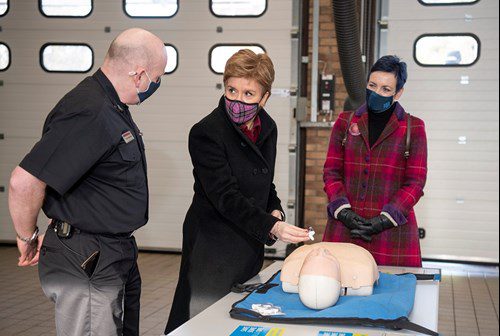First Minister Nicola Sturgeon and Minister for Drugs Policy Angela Constance visited Bathgate Community Fire Station to hear more about how the Scottish Fire and Rescue Service will set up a network of volunteers to administer naloxone.
SFRS staff will be given training in partnership with the Scottish Drugs Forum (SDF) as part of a £90,000 project funded by the Scottish Government, joining the Scottish Ambulance Service and Police Scotland in recognising the role the medication can play in saving lives.
First Minister Nicola Sturgeon said: “I want to thank the Scottish Fire and Rescue Service for the incredible job they do every day to save lives.
“SFRS staff regularly interact with the public during operational incidents, prevention and protection work and community engagement and it is reassuring to know that if they come across a situation involving an opioid overdose that volunteers will be able to administer naloxone while they wait for an ambulance to arrive.
“Naloxone is one of a wide range of measures being used to address the public health emergency of drugs deaths, but it plays an important role and allows those administering the kits to connect people who use drugs and their families with appropriate local services.
“Of course, we want to help people long before they get to the point of a life-threatening overdose and we are working hard to increase the number of people in treatment backed by total funding of £250 million over five years.”
Assistant Chief Officer Stuart Stevens is the SFRS Director of Service Delivery. He said: “We welcome funding from the Scottish Government to provide life-saving medication for some of the most vulnerable people in our communities.
“We will fully support volunteers within SFRS to complete training to safely administer naloxone to help prevent avoidable drug deaths from overdoses. This project highlights our commitment to working with partners to improve the safety and wellbeing of the people of Scotland.”
Group Commander Paul Blackwood, pictured giving a demonstration of how the nasal spray works, took part in training from SDF a year ago and is encouraging colleagues to take up this opportunity. He decided to carry naloxone after a personal tragedy. Paul said: “I grew up in Glasgow and I lost my best friend at the age of 19 from a drugs overdose. This traumatic experience has stayed with me and so it was important for me to volunteer to carry naloxone. I have the kit because I want to be in a position to save someone’s life.”
A naloxone information pack will be available to all SFRS staff. Firefighters who volunteer to undergo training to carry and deploy naloxone will be given guidance on how to identify the signs and symptoms of an opioid overdose and how to use the medication to reverse these effects.
Find out more about the national Stop The Deaths campaign.





